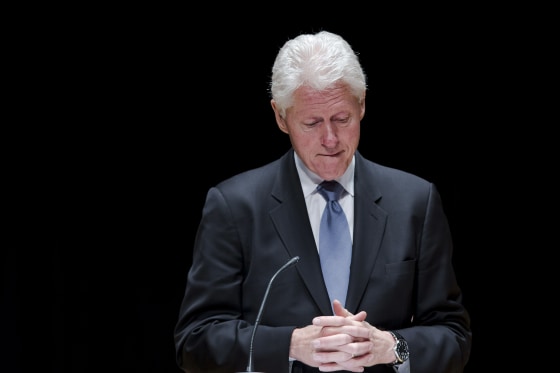Bill Clinton wants you to know that he feels the plight of the poor. But there's only so far he's willing to go to embrace the populist turn of the Democratic Party.
In a speech on Thursday, Clinton decried the impact of poverty on ordinary Americans and stressed the government's role in helping to combat it -- without calling for soaking the rich.
"Poverty is not just a statistic -- it’s the story of people’s lives," the former president told an audience at a DC conference on poverty. He described visiting farmers in rural Malawi as part of his work with the Clinton Foundation and called for the audience in the hotel's Grand Ballroom to do a moment of soul-searching.
"Did you ever think about why you’re not poor? Why are you not poor?" he asked.
Clinton trumpeted his own achievements in helping Americans become not poor. The gains during his two terms in the White House, from 1991 to early 2001, "not only reflected a strong economy but a consistent and highly focused effort on reducing poverty," he said.
Instead of defending his decision to sign welfare reform into law -- which increased extreme poverty, though the poverty rate overall declined -- Clinton touted his historic expansion of the Earned Income Tax Credit, a more effective anti-poverty measure.
But in contrast to other recent speeches and interviews, Clinton pointedly downplayed the importance of income inequality at the event, sponsored by the Brookings-affiliated Hamilton Project.
"The absence of social mobility is a far bigger problem than income inequality. Americans don’t resent other people’s success -- what they resent is not having a fair chance," he said.
He added that he supports "the majority of the tax rates on upper income people at my level. I’ve got no problem with any of it. We should pay more taxes, those of us in high income groups," he reassured the audience. "That’s where the money is."
What Clinton didn't mention was the fact that he lowered the capital gains tax in 1996, which disproportionately benefits the wealthy. He also left out the repeal of Glass-Steagall under his administration, which deregulated investment banking.
Instead of villainizing big business, Clinton stressed the good deeds that mega-corporations, non-profits, and other private-sector organizations could do in combating poverty and helping the common good.
"There are conservative ways to do this," Clinton said, describing a steel factory headed by a Republican who provided education credit for its workers. He similarly lauded Starbucks for launching a tuition reimbursement plan.
Clinton, ever the savvy politician, made sure to note that his wife has been doing great anti-poverty work outside of government as well.
"Hillary and her Too Small to Fail initiative is partnered with Melinda Gates with the Gates Foundation to try and do something about that," said Clinton, mentioning the child-development program funded by his foundation. "They’ll get a lot more done working together than they would working by themselves."
Clinton ultimately knows there's only so far he can get away from his legacy. On Thursday, he was introduced by none other than Robert Rubin, the former Treasury secretary and Citigroup executive who fiercely fought attempts to regulate over-the-counter derivatives in the 1990s. Rubin now works with the Hamilton Project.
When he took the stage, Clinton joked that everyone should be introduced by "someone you gave a job to."
